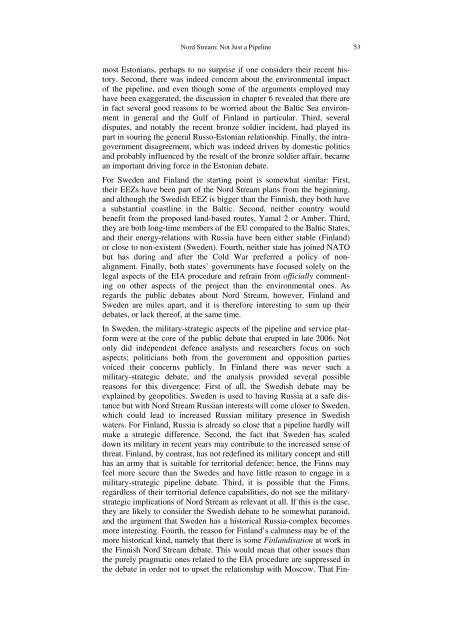Nord Stream: Not Just a Pipeline
Nord Stream: Not Just a Pipeline
Nord Stream: Not Just a Pipeline
Create successful ePaper yourself
Turn your PDF publications into a flip-book with our unique Google optimized e-Paper software.
<strong>Nord</strong> <strong>Stream</strong>: <strong>Not</strong> <strong>Just</strong> a <strong>Pipeline</strong> 53<br />
most Estonians, perhaps to no surprise if one considers their recent history.<br />
Second, there was indeed concern about the environmental impact<br />
of the pipeline, and even though some of the arguments employed may<br />
have been exaggerated, the discussion in chapter 6 revealed that there are<br />
in fact several good reasons to be worried about the Baltic Sea environment<br />
in general and the Gulf of Finland in particular. Third, several<br />
disputes, and notably the recent bronze soldier incident, had played its<br />
part in souring the general Russo-Estonian relationship. Finally, the intragovernment<br />
disagreement, which was indeed driven by domestic politics<br />
and probably influenced by the result of the bronze soldier affair, became<br />
an important driving force in the Estonian debate.<br />
For Sweden and Finland the starting point is somewhat similar: First,<br />
their EEZs have been part of the <strong>Nord</strong> <strong>Stream</strong> plans from the beginning,<br />
and although the Swedish EEZ is bigger than the Finnish, they both have<br />
a substantial coastline in the Baltic. Second, neither country would<br />
benefit from the proposed land-based routes, Yamal 2 or Amber. Third,<br />
they are both long-time members of the EU compared to the Baltic States,<br />
and their energy-relations with Russia have been either stable (Finland)<br />
or close to non-existent (Sweden). Fourth, neither state has joined NATO<br />
but has during and after the Cold War preferred a policy of nonalignment.<br />
Finally, both states’ governments have focused solely on the<br />
legal aspects of the EIA procedure and refrain from officially commenting<br />
on other aspects of the project than the environmental ones. As<br />
regards the public debates about <strong>Nord</strong> <strong>Stream</strong>, however, Finland and<br />
Sweden are miles apart, and it is therefore interesting to sum up their<br />
debates, or lack thereof, at the same time.<br />
In Sweden, the military-strategic aspects of the pipeline and service platform<br />
were at the core of the public debate that erupted in late 2006. <strong>Not</strong><br />
only did independent defence analysts and researchers focus on such<br />
aspects; politicians both from the government and opposition parties<br />
voiced their concerns publicly. In Finland there was never such a<br />
military-strategic debate, and the analysis provided several possible<br />
reasons for this divergence: First of all, the Swedish debate may be<br />
explained by geopolitics. Sweden is used to having Russia at a safe distance<br />
but with <strong>Nord</strong> <strong>Stream</strong> Russian interests will come closer to Sweden,<br />
which could lead to increased Russian military presence in Swedish<br />
waters. For Finland, Russia is already so close that a pipeline hardly will<br />
make a strategic difference. Second, the fact that Sweden has scaled<br />
down its military in recent years may contribute to the increased sense of<br />
threat. Finland, by contrast, has not redefined its military concept and still<br />
has an army that is suitable for territorial defence; hence, the Finns may<br />
feel more secure than the Swedes and have little reason to engage in a<br />
military-strategic pipeline debate. Third, it is possible that the Finns,<br />
regardless of their territorial defence capabilities, do not see the militarystrategic<br />
implications of <strong>Nord</strong> <strong>Stream</strong> as relevant at all. If this is the case,<br />
they are likely to consider the Swedish debate to be somewhat paranoid,<br />
and the argument that Sweden has a historical Russia-complex becomes<br />
more interesting. Fourth, the reason for Finland’s calmness may be of the<br />
more historical kind, namely that there is some Finlandisation at work in<br />
the Finnish <strong>Nord</strong> <strong>Stream</strong> debate. This would mean that other issues than<br />
the purely pragmatic ones related to the EIA procedure are suppressed in<br />
the debate in order not to upset the relationship with Moscow. That Fin-













